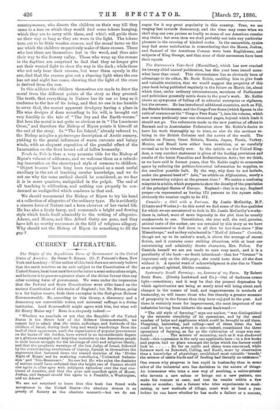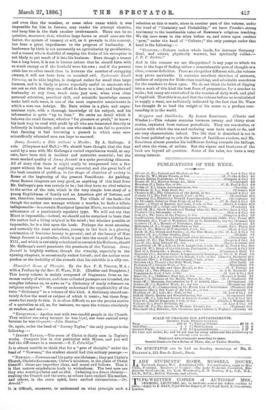Systematic Small Farming ; or, Lessons of my Farm. By
Robert Scott Barn. (Crosby Lockwood and Co.)—Oat of darkness comes light—sometimes; and it may be that the present depression by which agriculturists are being so sorely tried will bring about such changes in the tenure of land, and improvements in methods of husbandry, as will insure those who live thereby a greater measure of prosperity in the future than they have enjoyed in the past. And there is certainly room for improvement, the most important of our industries having been hitherto the most backward:—
" The old style of farming," says our author, " was distinguished by the extreme simplicity of its operations, and by the small number of helps and appliances which could be brought to aid them. Ploughing, harrowing, and rolling—and of these three the last could not be, nor was, always in use—indeed, constituted the three operations of farming, as far as the cultivation of crops was con- cerned The science of manuring, such as it was shadowed forth—this expression is trhe only one applicable here —in a few books and papers, had no place amongst the help& which the farmer could look to So far as cattle and sheep were concerned, while farmers such as Bakewell, Coiling, and Booth, more by observation than a knowledge of physiology, established most valuable breeds,' the- science of cattle-foods and of feeding had literally no exiatenee."
One reason why progress is less rapid in husbandry than in some other of the industrial arts lies doubtless in the nature of things. An ironmaater who tries a new way of smelting, a calioo-printer who invents a new colour or brings out a new pattern, can make his venture at once, and test its results within a few weeks or months ; but a farmer who tries experiments in stock- raising, or new methods of tillage, must wait at least a year before be can know whether he has made a failure or a success,
and even then the weather, or some other cause which it was impossible for him to foresee, may render his attempt abortive, and keep him in the dark another twelvemonth. There can be no question, moreover, that, whether large farms or small ones are the better, the system of tenancy at will, as it prevails in this country, has been a great impediment to the progress of husbandry. A landowner by birth is not necessarily an agriculturist by predilection, and a tenant who is doubtful of reaping the fruits of his enterprise is not likely to put mach of it into his business. Even though a tenant has a long lease, it is not in human nature that he should farm with as much energy as if the freehold were his own ; and if the present crisis has no other result than to increase the number of occupying owners, it will not have been an unmixed evil. Systematic Small Farming, as its title implies, is designed rather for small than large farmers, and it is likely to prove especially useful to amateurs who are not so rich that they can afford to farm to a loss ; and haphazard husbandry at any time, much more just now, when even close personal attention, practical skill, and scientific knowledge cannot make both ends meet, is one of the most expensive amusements in which a man can indulge. Mr. Burn writes in a plain and unpre- tentious style, with a thorough knowledge of his subject, and his information is quite "up to date." He omits no detail which it behoves the small farmer, whether "for pleasure or profit," to know; his book may be read with profit by all who are interested directly or indirectly in husbandry, and no one who reads it can fail to perceive that farming is fast becoming a pursuit in which none save scientifically educated men can hope to succeed.



































 Previous page
Previous page